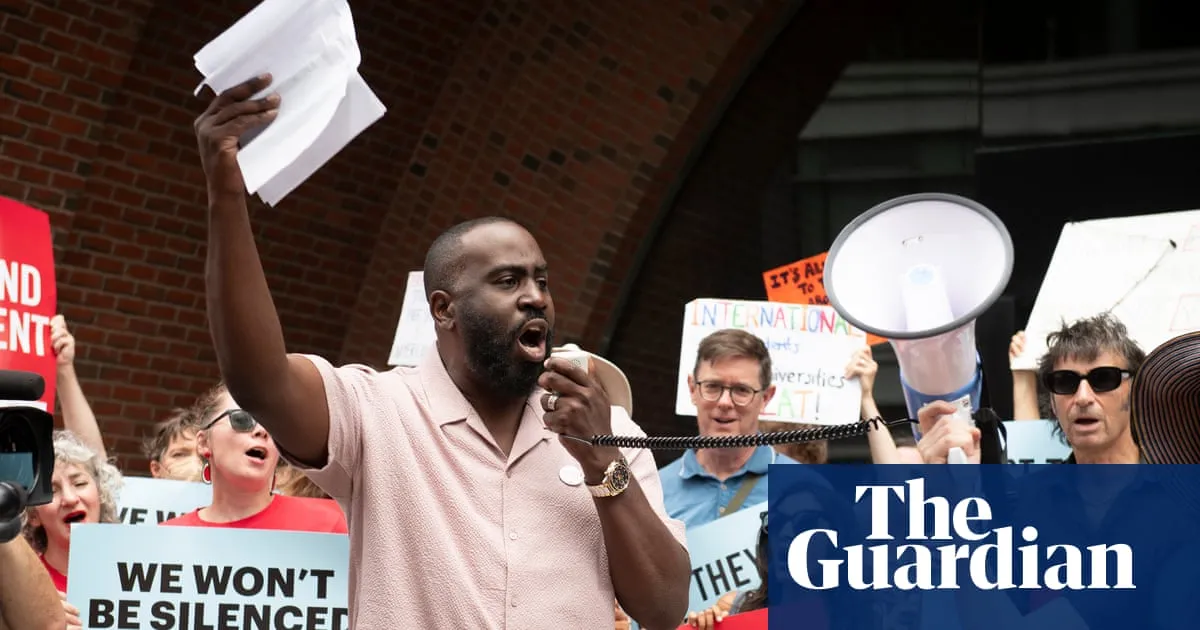
A federal judge has delivered a significant ruling stating that the Trump administration’s policy to detain and deport foreign scholars based on their pro-Palestinian views is unconstitutional. This decision, which aims to protect free speech rights, came after a case was brought forward by the American Association of University Professors (AAUP) and other academic organizations, including chapters from Harvard, Rutgers, and New York University, as well as the Middle East Studies Association (Mesa). The case was initiated following the arrest and detention of several non-citizen students and scholars advocating for Palestinian rights.
In a comprehensive 161-page ruling issued on Tuesday, Judge William G. Young, appointed by Ronald Reagan, emphasized the importance of the case, calling it “perhaps the most important ever to fall within the jurisdiction of this district court.” In his ruling, Judge Young addressed a crucial constitutional question: whether non-citizens lawfully present in the United States possess the same free speech rights as citizens. His answer was unequivocal: “yes, they do.”
“No law” means “no law,” Judge Young cited, referencing the First Amendment’s stipulation that Congress “shall make no law” that abridges the freedom of speech. He further clarified that while no one’s freedom of speech is unlimited, the restrictions apply equally to both citizens and non-citizens.
The plaintiffs accused the government of implementing an illegal “ideological-deportation policy” after the Trump administration signed two executive orders in January. These orders targeted non-citizens who “espouse hateful ideology” and aimed to combat antisemitism. However, the government denied the existence of such a policy, suggesting it was a figment of the plaintiffs’ “imagination.” They argued that each case was evaluated individually, while also claiming the authority to deport non-citizens who have not committed any crimes but whose presence is deemed a threat to U.S. foreign policy.
During the trial, government attorneys attempted to block the release of documents that would shed light on the procedures for revoking student visas and determining the removability of green card holders. Testimonies from several State Department officials revealed that they were instructed to compile allegations against targeted individuals, often using information from the right-wing Canary Mission, a controversial pro-Israel group known for doxing pro-Palestinian scholars.
Filed in March and brought to trial in July, the case featured testimonies from both citizen and non-citizen scholars who described the “chilling effect” felt across campuses nationwide due to the arrests of individuals like Mahmoud Khalil, Mohsen Mahdawi, Rümeysa Öztürk, and Badar Khan Suri. These scholars have since been released while their immigration cases continue to be processed in court.
In response to the ruling, Todd Wolfson, president of the AAUP, condemned the Trump administration’s attempts to deport students based on their political beliefs, calling it “a betrayal of American values.” He stated, “This trial exposed their true aim: to intimidate and silence anyone who dares oppose them.” Wolfson warned that if left unchallenged, the administration’s actions could extend beyond pro-Palestinian voices, affecting anyone who speaks out.
Jameel Jaffer, director of the Knight First Amendment Institute, which represented the plaintiffs, praised the ruling as “historic.” He emphasized, “If the First Amendment means anything, it means the government can’t imprison people simply because it disagrees with their political views.” Jaffer welcomed the court’s reaffirmation of this foundational principle of democracy.
The U.S. Department of Justice has declined to comment on the ruling, and the State Department did not immediately respond to requests for comment. Legal experts anticipate that the ruling will likely be appealed, potentially reaching the U.S. Supreme Court.
Judge Young included a personal note in his decision, responding to an anonymous postcard he received in June that read, “Trump has pardons and tanks … What do you have?” To this, Young replied, “Alone, I have nothing but my sense of duty,” addressing the postcard's sender. He concluded, “Together, We the People of the United States – you and me – have our magnificent Constitution.”
In his ruling, Judge Young also offered a broader critique of the Trump administration, expressing concern that President Trump believes the American public is too divided to stand up for and defend the nation's most cherished constitutional values. “Is he correct?” Young questioned, leaving readers to ponder the implications of this ruling for the future of free speech in America.